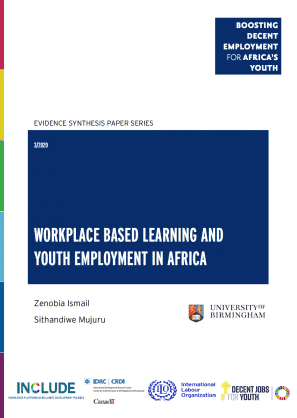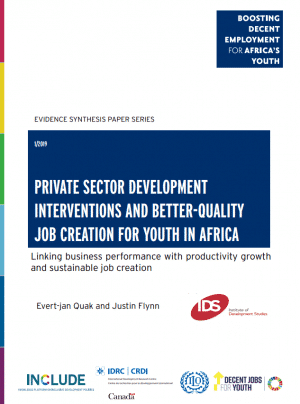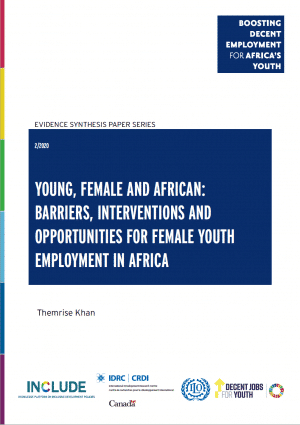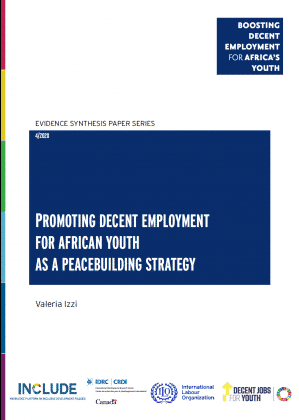
The quality of jobs matters and the success of youth employment programmes depends on a much deeper understanding of the choices young people make and the contexts within which they make them. Moreover, both urban and rural youth face a number of different and context-specific constraints on obtaining decent jobs. Finally, young women are consistently more disadvantaged than men in terms of their economic ability, as well as their access to employment in many sectors. These are some of the insights that have emerged from the evidence gathered for INCLUDE so far in the frame of ‘Boosting decent employment for Africa’s youth’ research initiative.
The evidence synthesis paper by Ismail and Mujuru on ‘Work-based learning and youth employment in Africa’ stresses that the progress of technical and vocational education (TVET) students and traditional or informal apprentices is generally hindered by problems with literacy caused by sub-optimal primary and secondary education. Moreover, it should be kept in mind that, so far, most workplace-based learning in Africa occurs through informal or traditional apprenticeships. The evidence suggest that workplace-based learning is more effective as a youth employment intervention if supported by policies that stimulate demand for young workers. Such policies encompass developing priority sectors in the economy and providing effective labour market information systems to better coordinate the supply of skills with the demand for workers.
The private sector, through job creation, was and will be the key to addressing the current youth employment crisis in Africa. Private sector development (PSD) interventions seek to improve firm performance and increase labour productivity in firms. However, micro and small firms often lack access to the more successful direct PSD interventions and rely mainly on training programmes and microfinance services. According to Quak and Flynn in the evidence synthesis paper ‘Private sector development interventions and better-quality job creation for youth in Africa’, PSD interventions alone will not automatically create the (better-quality) jobs needed for African youth. A balance must be struck between creating much needed short-term jobs and tackling underemployment in low-productive sectors in Africa and creating better-quality jobs in high-potential growth areas and large firms.
Khan, in her evidence synthesis paper ‘Young, female and African: barriers, interventions and opportunities for female youth employment in Africa’, confirms that young women are consistently more disadvantaged than men on the labour market. This is due to four key barriers faced by women, namely: social and cultural, economic, conflict and fragility, and skills development. The most successful interventions in addressing these four barriers were found to be a combination of those that support wellbeing, capacity building and access to jobs for women, as well as entrepreneurship. In addition, interventions that focus on providing women with access to, and control over, finance ensure greater success for women starting and maintaining businesses. Two emerging areas of opportunity were found to hold great potential for employing young women – mobile telecommunications and the digital economy – as well as the informal economy.
A straightforward correlation between employment and security is not confirmed by the evidence to date, according to Izzi in the evidence synthesis paper ‘Promoting decent employment for African youth as a peacebuilding strategy’. The quality of work is, therefore, a crucial variable to explain the connection between employment and peacebuilding. Moreover, youth employment programmes do not happen in sterile lab conditions – they are strongly intertwined with the local political economy context. Who gets which jobs, and how, is just as important from a peacebuilding perspective as the overall quantity of jobs created. The paper also suggests ‘connecting the dots’ more carefully between the extensive literature on employment, the world of work in Africa, and the body of research on new forms of violence and conflict. This can be done through an interdisciplinary approach and further evidence synthesis.
All authors of the evidence synthesis papers reiterate the importance of distinguishing youth-specific issues in relevant policies and stress the need for the much broader involvement of youth in decision-making processes. They also recognize that, for now, it is the informal sector that provides the most labour market opportunities for young men and women. Finally, to gain a clearer picture of the state and potential of employment opportunities for youth in Africa, the authors encourage better and more in-depth disaggregated data collection and analysis on young men and women in the labour market, across regions and income distribution levels.
INCLUDE's evidence synthesis papers series
- Work-based learning and youth employment in Africa (Ismail & Mujuru, 2020)
- Private sector development interventions and better-quality job creation for youth in Africa (Quak & Flynn, 2019)
- Young, female and African: barriers, interventions and opportunities for female youth employment in Africa (Khan, 2020)
- Promoting decent employment for African youth as a peacebuilding strategy (Izzi, 2020)
INCLUDE’s 2020 evidence synthesis papers series will address the following topics: digital skills and literacy in light of the future of work, youth employment in the rural economy, green jobs for youth, governments’ actions for youth employment and the impact of different types of crises on youth employment outcomes.
The series of evidence synthesis papers provides valuable lessons and recommendations, which may also be relevant in the current crisis brought on by the COVID-19 pandemic.




